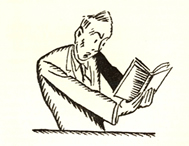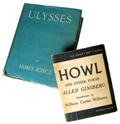March – June 2007
 The issue of obscenity is never black and white; shades of gray persist. Its meaning so vague and variable it is almost impossible to pin down. Here we explore the grayness surrounding two iconic works that were challenged and other materials published simultaneously that went unnoticed.
The issue of obscenity is never black and white; shades of gray persist. Its meaning so vague and variable it is almost impossible to pin down. Here we explore the grayness surrounding two iconic works that were challenged and other materials published simultaneously that went unnoticed.
The Odyssey of Ulysses
While living in Rome at the end of World War I, James Joyce began a seven-year effort that would result in one of the best novels of the 20th century: Ulysses. Originally, the novel was serialized in the American journal, The Little Review until its first legal challenge in 1920. The New York Society for the Suppression of Vice, led by John S. Sumner, objected to the book’s content and took action to keep the book out of the United States. At a trial in 1921 the magazine was declared obscene and as a result Ulysses was banned in the U.S.
 A year later Sylvia Beach, owner of a small Paris bookshop named Shakespeare and Co., agreed to publish the novel in its entirety. On February 2, 1922 (James Joyce’s fortieth birthday), the first two copies of the first edition were printed. This first edition with is familiar light-blue bound volume was considered contraband in the U.S. until 1933.
A year later Sylvia Beach, owner of a small Paris bookshop named Shakespeare and Co., agreed to publish the novel in its entirety. On February 2, 1922 (James Joyce’s fortieth birthday), the first two copies of the first edition were printed. This first edition with is familiar light-blue bound volume was considered contraband in the U.S. until 1933.
Howling Out Loud
On Friday, October 7, 1955, “a person named Allen Ginsberg” was scheduled to read some of his poetry at the Six Gallery in San Francisco. Though he had been writing poetry much of his young life, very little of it had been published. Yet in this one evening, Ginsberg and five other poets would blow the lid off the conformity of postwar America.
Lawrence Ferlinghetti, owner of City Lights Books, had been in the audience that evening. He too had felt a cathartic intensity when Ginsberg read Part I of Howl. The next morning Ferlinghetti sent Ginsberg a telegram: “I greet you at the beginning of a great career. When do I get the manuscript?” By November 1, 1956, Howl and Other Poems was published in the City Lights Pocket Poet Series. Little more than six months had passed when a store clerk at City Lights was arrested for selling a copy of Howl to undercover inspectors and a warrant for Ferlinghetti’s arrest was issued. A jury trial was waived, and the case was switched to Judge Clayton W. Horn’s court. Before the end of 1957, the store clerk and Ferlinghetti would be acquitted, and Howl would go into its fourth printing.
Acknowledgements
Exhibit Planning
Greg Prickman and Kristi Bontrager
Special Assistance in Planning and Research
Suzanne Corriell, Heather Davis, Amy Hutchinson, Sally Myers, Anne Shelley, Noelle Sinclair, Kathryn Stewart and Marilyn Swanson (graduate students in the School of Library and Information Science) and Laura Beals offered special assistance. Loren Glass, Charles Williams and Jen Wolfe served as exhibit advisors.
Production and Installation Assistance
Kristin Baum, Bill Voss
Graphic Design
Answer Ejiasi, IMU Marketing & Design
Illustrations
Marcel Arnac. Thirty-Six Inches of Adventure. New York: The Planet Press, 1930.
This book is available in the UI Libraries’ Special Collections.
